by Glenn | Aug 26, 2012 | Writing
Glenn’s Note: I have always stated Nicholas Guild is one of the few select authors I consider as my mentor of the writing craft. After all, one should choose the best to learn from. He’s been 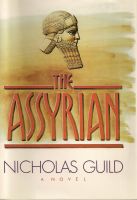 writing since 1975, has been published around the world with many of his works being international bestsellers, and as Publishers Weekly described him, is “…a master of timing, plot and style.” From The New York Times Book Review to the Washington Post, Nicholas Guild has received accolades aspiring writers dream of, and published authors wish for. I’m honored to present this article written by him for my website. His generosity in setting time aside to do so during his hectic schedule is truly appreciated. There is much to learn from my friend and I hope you will enjoy this as I did.
writing since 1975, has been published around the world with many of his works being international bestsellers, and as Publishers Weekly described him, is “…a master of timing, plot and style.” From The New York Times Book Review to the Washington Post, Nicholas Guild has received accolades aspiring writers dream of, and published authors wish for. I’m honored to present this article written by him for my website. His generosity in setting time aside to do so during his hectic schedule is truly appreciated. There is much to learn from my friend and I hope you will enjoy this as I did.
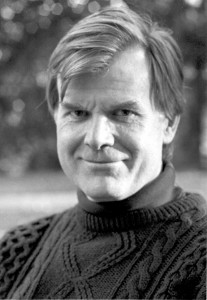 THE CHARACTER OF CHARACTER by Nicholas Guild
THE CHARACTER OF CHARACTER by Nicholas Guild
When I was teaching literature I had a colleague who liked to say, “There are no characters in fiction, only words,” and at the most literal level he was, of course, correct. A novel is merely another species of rhetorical performance, and when we read a story nothing happens in the world outside our nervous systems. We are only processing words.
The problem is that my colleague’s maxim is only literally true. It does not correspond to the ways people, both readers and writers, experience fiction. There is what Coleridge called “the willing suspension of disbelief.” We know, for example, that Elizabeth Bennett and Darcy are not real people and therefore they never actually fall in love, yet we always experience relief and pleasure when at last they come to a right understanding of each other. When we talk about any particular novel or story we talk about the characters as if they were real because on some level they are real for us. There is even a certain amount of neurological evidence that readers experience fiction in much the same way that we all experience real life, and with something like the same intensity. 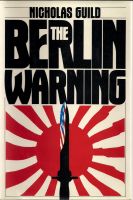
And when we talk about characters in fiction we are not far from the way we use the word “character” in real life. For instance, when we describe some real person as a “character” we are referring to a bundle of behavioral quirks that distinguish that person. Our impression of that person is defined by peculiarities of speech, dress, behavior, appearance, etc. which he or she exhibits. Thus in our imagination Theodore Roosevelt always has pince-nez glasses, a walrus moustache and, when he smiles, enormous teeth—and he is always describing things as “bully”.
Comic characters frequently have “character” in this sense. Mr. Micawber in David Copperfield always speaks with a comic formality which is instantly recognizable and is always waiting for “something to turn up.” Mr. Collins in Pride and Prejudice is always expatiating on the wealth, grandeur and “condescension” of his patroness Lady Catherine de Bourgh. Mammy Yokum in Li’l Abner of blessed memory always smokes a pipe, ends every discussion with the words “Ah has spoken!” and could have beaten Jack Dempsey to a pulp. Such characters are usually what E.M. Forster described as “flat”—two dimensional and with no psychological depth, no more than the sum of their mannerisms.
 Of course not all flat characters are comic. Television abounds with heroic types who are essentially flat. My personal favorite was always Steve McGarrett of Hawaii 5-O (if anyone remembers that series). He had a vocabulary of about four words—“Book ‘em. Murder One!”—and it is impossible to imagine what his childhood would have been like. But generally speaking we expect non-comic characters in fiction to have a little more depth. To use Forster’s term, we expect them to be “round”.
Of course not all flat characters are comic. Television abounds with heroic types who are essentially flat. My personal favorite was always Steve McGarrett of Hawaii 5-O (if anyone remembers that series). He had a vocabulary of about four words—“Book ‘em. Murder One!”—and it is impossible to imagine what his childhood would have been like. But generally speaking we expect non-comic characters in fiction to have a little more depth. To use Forster’s term, we expect them to be “round”.
Round characters are those we can imagine having an inner life. They are allowed, even expected, to exhibit contradictions. They are human the way we are human.
But to my mind there is one possible difference. Our sense of “character” in fiction is in many ways close to another way we use the word in real life, which is essentially moral. We speak of people as possessing “character” as an attribute, like eye color. George VI of England showed “character” during World War II by identifying himself personally with the goal of victory. He refused to let his family seek safety in Canada and he made it clear he would not come to any kind of terms with the Germans, even if England were overrun and occupied. He was prepared, apparently, to fight to his dying breath, and thus he revealed—or appeared to reveal—the core of his nature.expected, to exhibit contradictions. They are human they way we are human.
It is open to question whether any of us really have such unified personalities. Perhaps all we have are random clusters of impulses. I don’t pretend to know. But such unity is precisely what we expect to find in fictional characters.
 Of course fictional characters have the advantage of being knowable in a way real people simply are not.
Of course fictional characters have the advantage of being knowable in a way real people simply are not.
Our knowledge of the external world, and that includes our knowledge of other people, comes through the senses. We see other people, we hear them, we touch, smell and sometimes 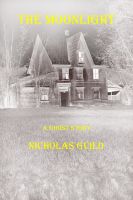 even taste them. Yet we are constantly being blindsided by our fellow mortals and discovering that the person we thought we knew doesn’t exist, is actually another sort of person altogether, and the reason this happens is not difficult to discover.
even taste them. Yet we are constantly being blindsided by our fellow mortals and discovering that the person we thought we knew doesn’t exist, is actually another sort of person altogether, and the reason this happens is not difficult to discover.
What do we actually know about anyone else’s inner life? Only what they choose to show us, or let slip—in other words, a highly edited version.
But characters in fiction are open to us. The author, who created them, tells us what they are thinking, sometimes even gives us a transcript. Their desires and anxieties are, quite literally, an open book to us. Therefore it is possible for us to know that core we think of as the essence of each person’s private humanity.
Thus, while we only intermittently judge each other, our moral judgments of characters in fiction are relentless. It is a point writers forget at their peril: readers read from within the context of their most conservative morality.
It is also worth remembering that controlling the sympathy of a reader is a complicated business. Think of the reader as resembling a bull wearing blinders and a ring in its nose. It can only see straight ahead, and straight ahead is a direction you control. The writer creates an imaginary world and all the reader can experience of it is what he or she is shown. The writer is in control, so he or she had better be careful.
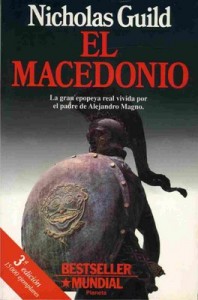 A student of mine once wrote a story about the interior life of a girl in a coma. The problem was that the girl had reached this state by mixing drugs and alcohol, which my student seemed to regard as the moral equivalent of being struck by lightning. It took me a while to convince her that the reader would judge her character negatively and that this would affect the impact of the story in ways she hadn’t anticipated and didn’t want.
A student of mine once wrote a story about the interior life of a girl in a coma. The problem was that the girl had reached this state by mixing drugs and alcohol, which my student seemed to regard as the moral equivalent of being struck by lightning. It took me a while to convince her that the reader would judge her character negatively and that this would affect the impact of the story in ways she hadn’t anticipated and didn’t want.
That was the sort of oversight which hopefully is restricted to the very young (my student, as I remember, was nineteen). Every writer wants the reader to be on the side of their hero or heroine. But the same considerations apply when you are creating a villain.
Villains are tough. If you make them too evil the reader will lose interest. Thus you have to make your villains credibly human. Why do they do all those terrible things? What do they want? The essence of the thing is that everyone has a point of view, even Jack the Ripper and Adolf Hitler, and real people are more interesting than monsters. The reader needs at least to understand the bad guy, so always provide him with a backstory.
End of sermon.
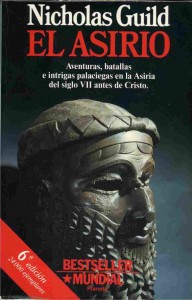
by Glenn | Aug 6, 2012 | Writing
It was a wonderful surprise and honor to receive an email from Joyce Faulkner, President of the Military Writers Society of America, which said: “Congratulations, Glenn! Your novel “Solomon’s Men” has been nominated as a finalist in the Mystery/Thriller genre of our 2012 Conference…” 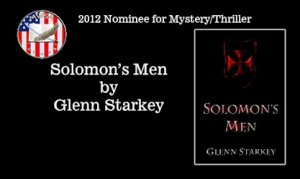
I say ‘surprise’ because that is exactly what it was… “Solomon’s Men” had been reviewed by a MWSA reviewer and received a very nice write-up which is posted on Amazon and Goodreads websites. Unknown to me, the reviewer entered my work in their upcoming conference to be held in September at Dayton, Ohio. MWSA yearly reviews hundreds of books and to be selected as a finalist is an honor in itself for me.
 The Military Writers Society of America is an organization with a large membership of current and former military personnel, as well as persons related and connected with the military services in some manner. The writers in the organization, and the categories and volumes of books you will find in MWSA is phenomenal. If you are a historian, served in the military, are researching wars your loved ones served in, or simply looking for good books of any genre to read, then Military Writers Society of America is for you. I highly recommend you stop in and browse the site, especially if you are a veteran. There are a lot of discussions on many topics of interest.
The Military Writers Society of America is an organization with a large membership of current and former military personnel, as well as persons related and connected with the military services in some manner. The writers in the organization, and the categories and volumes of books you will find in MWSA is phenomenal. If you are a historian, served in the military, are researching wars your loved ones served in, or simply looking for good books of any genre to read, then Military Writers Society of America is for you. I highly recommend you stop in and browse the site, especially if you are a veteran. There are a lot of discussions on many topics of interest.
And if you are on Goodreads, visit the MWSA Awards 2012 Nominees list of books and click a vote for “Solomon’s Men.” This has nothing to do with the conference awards, but is for recognition of the books.
Now comes the waiting to learn the final outcome of the nomination. To be recognized by MWSA is honor enough…winning the category will be the icing on the cake.
by Glenn | Jul 6, 2012 | Crime, General, Law Enforcement, Life
 There are times when reality hits home, gives you a wake-up call, and leaves you with the realization the dirty side of life still exists even though you may have forgotten or chose to ignore it. Some people don’t have the luxury to forget. They work it every day, seemingly living it because they must. It’s their job. Such are the men and women of the T.G.I.A., Texas Gang Investigators Association.
There are times when reality hits home, gives you a wake-up call, and leaves you with the realization the dirty side of life still exists even though you may have forgotten or chose to ignore it. Some people don’t have the luxury to forget. They work it every day, seemingly living it because they must. It’s their job. Such are the men and women of the T.G.I.A., Texas Gang Investigators Association.
After reading my novels, Mr. Paul Zamarripa, T.G.I.A. South Region Director, Position 1, contacted and invited me to attend their conference in San Antonio, Texas. That was quite an honor for me. Considering my former experience as a law enforcement officer, he believed it would be a good opportunity to present something different to the attendees; have me sign my books, talk with everyone, and allow them to see there can be life outside of their daily jobs which are mentally grueling.
Of course I accepted! What author wouldn’t? So for two full days I signed books, met old friends, people engaged in gang investigations and enforcement, and made new friends – one of which was Mr. Zamarripa.
Were the 750 conference attendees all cops? No. They ranged from federal agencies of all levels, constables, state, county and municipal law enforcement, and parole/probation officers to school counselors and court administration. Yes, I probably missed someone in that list of attendees. But as you can see, it takes such a spectrum of people, working hand in hand, to address today’s growing problems with gangs.
There was a time long, long ago when you said the word “gangs” and only images of leather-vested motorcycle riders and teenagers in neighborhoods with aerosol paint cans came to mind. The majority of the public never came in contact with them. Fast forward ahead and now everyone across our nation and in foreign countries is infected with a mounting crime rate rising from street thug gangs to violent drug cartel involvement. Big cities to small country towns, the types of crimes related to them seems endless: theft, burglary, drugs, rape, prostitution, kidnapping, assault, murder, and so on. And there are no barriers when it comes to age and social economic status as well. Children to adults are recruited, and the poor from slums and barrios to the college educated crowd living in well-to-do neighborhoods are brought into the fold.
What lies at the base of the gang problem? Money, economics; the list of reasons continues but those two are the meat and potatoes of the issue. And solving gang problems that have such far reaching tentacles into the criminal underworld often feels as if you are at the beach trying to hold back the waves of the ocean. 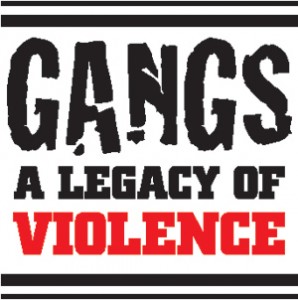
When drug cartels have enough money to recruit whole units of deserters from Mexican Army special forces units to do their violent bidding, they certainly have no qualms in hiring stateside ‘wannabe-gangstas’ or organized gangs to run dope and make hits on selected targets. Doing so keeps the cartel’s hands clean.
This is where the men and women of the T.G.I.A. come into play. They don’t just work ‘9 to 5’ and walk away at the end of the day. They live it ‘24-7’ and shift between the cruelties of the gang world and their home life, constantly struggling to maintain their sanity and a positive outlook on society. Their phones ring day and night and they are often called away for investigations while enjoying a little time with family. That’s one reason divorce rates are high in police work. While I was at the conference I listened to probation officers getting calls about parole violators, and investigators talking to patrol officers about certain ‘tats’ on a suspect.
 Conferences are important for several reasons – networking, sharing intel, learning from one another – earning educational hours required by the State of Texas as part of their continuing education to retain their licenses – but to me, most of all, it gives them some down time to clear their heads, especially when you are not working undercover and feel you need to always dress the part of being a gang member. Like patrol officers and detectives working the streets, it’s easy to get wrapped up in the ‘us versus them’ syndrome whereby it’s the police against everyone outside of law enforcement because all you see is the crap side of life and wonder if anyone good is left other than another cop.
Conferences are important for several reasons – networking, sharing intel, learning from one another – earning educational hours required by the State of Texas as part of their continuing education to retain their licenses – but to me, most of all, it gives them some down time to clear their heads, especially when you are not working undercover and feel you need to always dress the part of being a gang member. Like patrol officers and detectives working the streets, it’s easy to get wrapped up in the ‘us versus them’ syndrome whereby it’s the police against everyone outside of law enforcement because all you see is the crap side of life and wonder if anyone good is left other than another cop.
The stories these people can tell you about gang violence and activities and working the streets would make most authors’ crime novels look like kindergarten books.
Take the time to browse various websites of your local law enforcement such as Stop Houston Gangs and related associations such as the T.G.I.A. Read about the crimes gangs commit and how they operate. See for yourself how big the problems truly are. After all, the end product of their criminal acts affects your tax dollars!
What can you do to help? First, start by telling your children they are loved – and talk to them. Have conversations with them about problems they see and may be confronted with in school or in the neighborhood. Don’t wait until your children are teenagers. Start talking to them when they are much younger.
Gangs are a subject which could be studied for semesters in a classroom setting and you still wouldn’t learn all there is to know. So my hat’s off to the members of the TGIA, as well as all law enforcement related personnel, for their commitment to keeping our streets clean.
And my thanks to Mr. Paul Zamarippa for the invitation which allowed me to learn about this association.
Glenn
by Glenn | Jun 1, 2012 | Writing
 I’ve been away from my computer for several days. I needed time to think about my writing path, plus a long list of unattended activities demanded attention. Sometimes a writer needs a break in the form of physical work. It helps clear your head and allows you to refocus on your overall efforts.
I’ve been away from my computer for several days. I needed time to think about my writing path, plus a long list of unattended activities demanded attention. Sometimes a writer needs a break in the form of physical work. It helps clear your head and allows you to refocus on your overall efforts.
On March 4th I wrote the article Missing in Action, Part 1: Author Nicholas Guild, “The Assyrian”. He’s the one author I’ve always considered the finest example of a true historical fiction writer. I wrote the article and never anticipated Nicholas Guild would read it. After all, here was an esteemed author who left the literary world with awards, accolades, and multiple published books that have been translated into several languages. Guild has never heard of me and I seriously doubt if he’s even seen my works or my website.
But today, as I returned home after finishing a number of tasks, for some reason I began to think of Mr. Guild and my article about him. I thought of how my break of several days away from writing had let me realize the urge, the desire to create, still remained and was as strong as ever. It was all passing thoughts, the kind you have when you’re tired, sweaty, and need a good shower. Yes, maybe Nicholas Guild just needed a break himself, only he was taking a much longer one than me.
Now, true story: After I showered, poured a cup of hot, fresh coffee and grabbed a cup full of my grandson’s favorite Honey Graham ‘Teddy’ Crackers to munch on (you know, those little bear snacks you can’t stop eating), I sat at my computer to check my website for comments awaiting approval. With the graham cracker container sitting next to my coffee cup, and my left hand steadily reaching in to get a cracker while I’m reading the monitor and my right hand is feverishly working the mouse, I suddenly realized I was reading a comment from Nicholas Guild—‘the’ Nicholas Guild—and that was when I reached deep into my hot cup of coffee instead of the cracker cup. With coffee flying everywhere, me flailing my hand through the air and yelling things I was glad my grandson wasn’t around to hear, I jumped out of my chair. I couldn’t believe it. First, that I had done such a stupid act, and second, that Guild had actually responded to my blog.
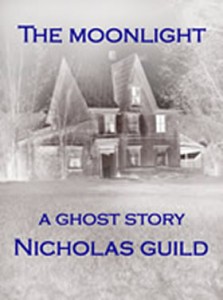 Rushing to wash my hands and wipe coffee off my monitor screen and desk, I finally was able to return my attention to his comment:
Rushing to wash my hands and wipe coffee off my monitor screen and desk, I finally was able to return my attention to his comment:
May 26 2012 Nicholas Guild I just read your highly flattering blog. Thank you for the kind words. I thought I’d let you know that I’m back in front of my word processor and I have a new book out in ebook form, “The Moonlight,” which is a sort of ghost story. I’m now working on another historical, set in 4th Century B.C. Greece.
Yes, after reading it four times, the words had not changed and the name remained the same—and for the sake of personal safety I moved the coffee to the opposite side of my desk. I guess God works in mysterious ways and this was His way of telling me to return to my writings. But, now how do I respond to a man I’ve always wanted to talk to without sounding like a blithering idiot? I just finger dunked my coffee cup so that spoke well of my mental faculties. During the years I performed Executive Protection, I worked with a lot of big names and heavy hitters, but here was someone I truly respected for many reasons. So I typed, then deleted, typed, deleted, and finally arrived at this:
May 31 2012 Glenn Mr. Guild, very few things surprise me anymore but seeing comments from you truly did! Your return to writing is great news and I look forward to reading more of your work. I wish you the best in all of your endeavors.
After clicking the reply button, I sat waiting for a comment to appear as if he were on the other end ready to respond immediately. What can I say? I think he is an excellent author and I was extremely happy to have received his comments to my article.
Nicholas Guild has his first ebook “The Moonlight” now out – and it’s his first try at horror. In addition to that, he is working on another historical—the first in many years. I went to his website, downloaded a sample of “The Moonlight” and intend to read it tomorrow. Nicholas Guild is returning to his writings, life is good, and my burned fingers will eventually heal….
There are a lot of lessons to be learned in this, aside from keeping crackers and coffee apart from one another while you read. We’re all human, with shortcomings, personal faults, and  problems that stir our souls. Guild was at the top of his game when he chose to take a break for whatever reasons. But he returned to writing because it’s simply in his blood to create. He may have left for a while to go teach, yet he returned. I returned to my writings after ten years away. You can’t fight what you truly are any more than a leopard can change its spots. Nicholas Guild was born to be an author. There is no denying that fact after you read one of his novels.
problems that stir our souls. Guild was at the top of his game when he chose to take a break for whatever reasons. But he returned to writing because it’s simply in his blood to create. He may have left for a while to go teach, yet he returned. I returned to my writings after ten years away. You can’t fight what you truly are any more than a leopard can change its spots. Nicholas Guild was born to be an author. There is no denying that fact after you read one of his novels.
Good luck, Mr. Guild. Someday I hope you will read one of my novels with equal pleasure as I’ve read yours. And feel free to write me any time you wish.
Warmest Regards,
Glenn
http://www.nicholasguild.com
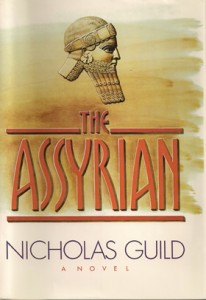
by Glenn | May 24, 2012 | General
 I doubt if wars will ever end during my lifetime or even that of my grandson’s. They have existed in some form for hundreds of reasons since the first cave man led his tribe against a neighboring tribe. I doubt too if there has ever been a single year since recorded history when a war was not being fought in some location about the world.
I doubt if wars will ever end during my lifetime or even that of my grandson’s. They have existed in some form for hundreds of reasons since the first cave man led his tribe against a neighboring tribe. I doubt too if there has ever been a single year since recorded history when a war was not being fought in some location about the world.
As a writer, I read quite a bit of history during the research periods for my novels. Often I come upon the stories of little known wars now lost to time in faraway places where the reasons for battle were ridiculous. But, there are an equal number of stories where freedom against oppression was the courageous driving force and no alternative existed except to fight. Between the ridiculous and courageous reasons for the wars lie the surviving veterans, the wounded, the dead, and those family members and loved ones left to mourn.
Active duty men and women in our armed forces fulfill the need to protect us around the clock and serve wherever the need sends them, regardless of the hardships they and their families must endure. The veteran, wounded or not, looks back upon his or her military service with mixed emotions of pride at having served, remorse at the loss of friends and comrades, and must live with the memories and harsh realities of what they participated in and witnessed. As for the dead, they now rest in silence with GOD, hoping their ultimate sacrifice was not in vain.
Memorial Day has gone through many changes since its first creation as Decorations Day. Now it encompasses all military personnel, past and present, rather than only those that died. From the simple act of placing flowers upon a grave to parades in some communities, we honor our armed forces and remember in our own ways.
Until you have lost your freedom, you will never fully understand the value of it. Until you look upon the stars and stripes furling above you in the breeze, and realize the true value of your nation, you will never fully understand the sacrifices made for it.
Admiral Chester Nimitz made two famous statements. After the fierce fighting on Iwo Jima, he said, “Among the Americans serving on Iwo island, uncommon valor was a common virtue.”
And speaking of those who died in the war in the Pacific, which may be stated for all wars, he said, “They fought together as brothers in arms; they died together and now they sleep side by side…To them, we have a solemn obligation — the obligation to ensure that their sacrifice will help make this a better and safer world in which to live.”
Wherever you are on Memorial Day or any other day, take a moment to pay tribute to all that have given of themselves from every race, creed and color, so you may now have the freedom to do as you wish. There is no glory in war, only pain and suffering. Even its victory in the end is bittersweet.
Glenn Starkey
USMC, 1969-1974, Vietnam veteran
|
In Flanders Fields
John McCrae, 1915.
|
In Flanders fields the poppies blow
Between the crosses, row on row
That mark our place; and in the sky
The larks, still bravely singing, fly
Scarce heard amid the guns below.
We are the Dead. Short days ago
We lived, felt dawn, saw sunset glow,
Loved and were loved, and now we lie
In Flanders fields.
Take up our quarrel with the foe:
To you from failing hands we throw
The torch; be yours to hold it high.
If ye break faith with us who die
We shall not sleep, though poppies grow
In Flanders fields. |
 writing since 1975, has been published around the world with many of his works being international bestsellers, and as Publishers Weekly described him, is “…a master of timing, plot and style.” From The New York Times Book Review to the Washington Post, Nicholas Guild has received accolades aspiring writers dream of, and published authors wish for. I’m honored to present this article written by him for my website. His generosity in setting time aside to do so during his hectic schedule is truly appreciated. There is much to learn from my friend and I hope you will enjoy this as I did.
writing since 1975, has been published around the world with many of his works being international bestsellers, and as Publishers Weekly described him, is “…a master of timing, plot and style.” From The New York Times Book Review to the Washington Post, Nicholas Guild has received accolades aspiring writers dream of, and published authors wish for. I’m honored to present this article written by him for my website. His generosity in setting time aside to do so during his hectic schedule is truly appreciated. There is much to learn from my friend and I hope you will enjoy this as I did. THE CHARACTER OF CHARACTER by Nicholas Guild
THE CHARACTER OF CHARACTER by Nicholas Guild
 Of course not all flat characters are comic. Television abounds with heroic types who are essentially flat. My personal favorite was always Steve McGarrett of Hawaii 5-O (if anyone remembers that series). He had a vocabulary of about four words—“Book ‘em. Murder One!”—and it is impossible to imagine what his childhood would have been like. But generally speaking we expect non-comic characters in fiction to have a little more depth. To use Forster’s term, we expect them to be “round”.
Of course not all flat characters are comic. Television abounds with heroic types who are essentially flat. My personal favorite was always Steve McGarrett of Hawaii 5-O (if anyone remembers that series). He had a vocabulary of about four words—“Book ‘em. Murder One!”—and it is impossible to imagine what his childhood would have been like. But generally speaking we expect non-comic characters in fiction to have a little more depth. To use Forster’s term, we expect them to be “round”. Of course fictional characters have the advantage of being knowable in a way real people simply are not.
Of course fictional characters have the advantage of being knowable in a way real people simply are not. even taste them. Yet we are constantly being blindsided by our fellow mortals and discovering that the person we thought we knew doesn’t exist, is actually another sort of person altogether, and the reason this happens is not difficult to discover.
even taste them. Yet we are constantly being blindsided by our fellow mortals and discovering that the person we thought we knew doesn’t exist, is actually another sort of person altogether, and the reason this happens is not difficult to discover. A student of mine once wrote a story about the interior life of a girl in a coma. The problem was that the girl had reached this state by mixing drugs and alcohol, which my student seemed to regard as the moral equivalent of being struck by lightning. It took me a while to convince her that the reader would judge her character negatively and that this would affect the impact of the story in ways she hadn’t anticipated and didn’t want.
A student of mine once wrote a story about the interior life of a girl in a coma. The problem was that the girl had reached this state by mixing drugs and alcohol, which my student seemed to regard as the moral equivalent of being struck by lightning. It took me a while to convince her that the reader would judge her character negatively and that this would affect the impact of the story in ways she hadn’t anticipated and didn’t want.










